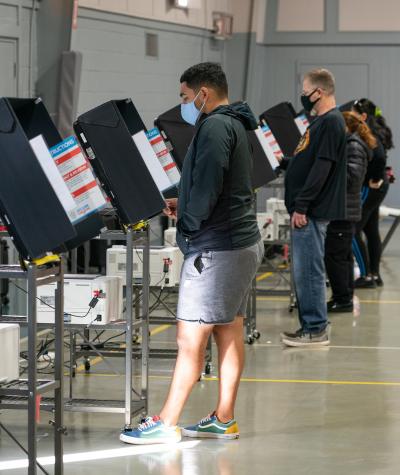Election officials across the country are extraordinarily busy in the weeks leading up to the general election, with many administrative and logistical tasks to complete to ensure that elections in their communities run smoothly and securely.
Yet in many states, election offices are being inundated with frivolous mass challenges to voters’ eligibility, part of a widespread effort to undermine confidence in elections and, in some cases, prevent eligible citizens from exercising their freedom to vote.
Just last month, Georgia’s Gwinnett County Board of Elections received challenges to the eligibility of some 37,500 Gwinnett County voters—more than six percent of the county’s total registered voters, and more than three times President Biden’s 2020 margin of victory in Georgia. These mass challenges in Gwinnett County mirror similar efforts in other Georgia counties, as well as in Texas, Florida, Iowa and Michigan.
Partisan actors have shamefully weaponized laws in nearly every state that allow private citizens to challenge their peers’ right to vote, either before or on Election Day. These mass challenges can be based on meritless allegations such as a voter having changed addresses, and often rely on faulty data sets containing inaccurate or outdated information. If successful, these challenges can lead to eligible voters’ removal from the rolls, preventing them from participating in an election in which they are legally entitled to vote.
Voter challenge laws have long been used in this country to target voters of color, student voters and voters with disabilities. Indeed, many states first enacted their voter challenge laws following Reconstruction to block newly enfranchised Black voters from accessing the polls.
Despite the discriminatory history of these laws, 46 states still allow problematic challenges to voters’ eligibility, some with few constraints to deter frivolous complaints by politically motivated challengers targeting vulnerable populations. Without adequate guardrails, these laws allow bad-faith actors to overwhelm election officials, disenfranchise voters with frivolous mass challenges and reduce confidence in the electoral process.
Mass ballot challenges also undermine election administration. Relying on unreliable data and predatory practices, challengers typically allege that thousands of voters are ineligible at once based on a single data set, without explaining how they reached any conclusion about each particular challenged voter.
These flimsy challenges do nothing to increase faith in elections. States must already conduct list maintenance programs to remove ineligible voters under the National Voter Registration Act (NVRA) and have access to more reliable data than private actors with little training.
What’s more, a flood of mass challenges can overwhelm county officials, disrupting their ability to fulfill their critical responsibilities to conduct the election securely and accurately—especially if they are made in the last few days or weeks leading up to an election.
For example, the Gwinnett County Elections Board has had to divert five to 10 of their staffers, six days a week to sorting through challenges, making it “harder and harder to run a quality election,” according to the county’s elections supervisor.
Finally, mass voter challenges risk preventing hundreds of thousands of Americans from exercising their freedom to vote, either through erroneous disqualification or voter intimidation. There are many reasons a voter might appear to have moved addresses but remains an eligible voter. Regardless, this should not disqualify someone from voting.
Campaign Legal Center is actively working with state and local stakeholders to limit the potential negative impact of mass challenges through legal action, legislative advocacy and education. Most recently, CLC took steps to ensure that Georgia’s response to the spate of mass challenges complies with federal law protecting voters from purges in the leadup to an election.
Beyond the midterm elections, all states that permit voter eligibility challenges should protect their challenge processes from abuse by bad-faith actors. Every state can reduce frivolous challenges by ensuring that voters are entitled to a presumption of eligibility and clarifying that challengers bear the burden of proof. Doing so will both protect voters from being unfairly removed from the registration rolls and keep election officials from being overwhelmed by a flood of baseless requests.
For example, states can emulate New Hampshire’s requirement that all challengers provide “a specific source of the information or personal knowledge” of each challenged voter’s ineligibility. Doing so would help ensure that any successful claim is supported by individualized, reliable evidence instead of automated challenges conducted en masse using faulty data.
Relatedly, states should empower election officials to quickly dismiss any challenges that don’t meet a sufficient evidentiary burden, so voters and election officials only have to respond to legitimate challenges. Finally, states should ensure that all voters have a fair opportunity to respond to non-frivolous allegations on or before Election Day.
Our democracy works best when all eligible voters can participate. To make every vote count, we need a system that is free and fair to ensure that everyone’s voice is heard. States can and should take action to ensure that mass voter challenges don’t threaten this basic democratic ideal.

